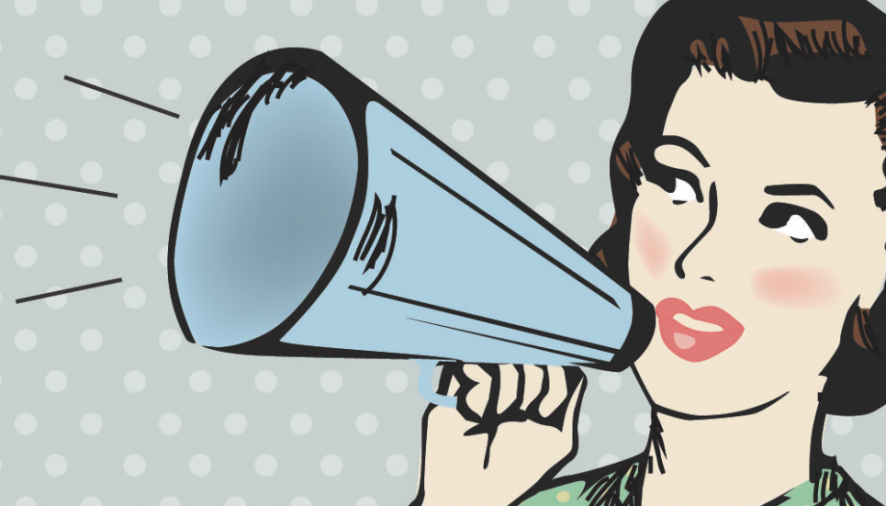Today, on International Women’s Day, The Gryphon are marking the occasion by asking women about their experiences in our society.
[ht_highlight color=”blue”]Abla’s Story[/ht_highlight]
Empowering Muslim women have no place in the mainstream media and there are still obvious discrepancies in the depiction of BME women.
Being a woman has never felt more empowering in an age where women are fined for what they choose to wear, shunned for not conforming to the mediated standards of beauty yet struggle and continue to challenge the status-quo. But for most of my childhood years, growing up as a self-defined Black Muslim girl in a predominantly White area, self-love was a far-fetched concept. It wasn’t until my religious beliefs became obvious, when I chose to wear the headscarf at fourteen, that sexist and racial prejudices became more perceptible. This challenged both my personal and religious beliefs. I had become too accustomed to slurs like ‘Paki’ (I’m Arab) and spoken to by strangers as though I couldn’t understand English. The way I dressed was constantly defined as a weakness and over time I allowed the antagonism to define me. I blame the media (and patriarchy). Reflecting on this now makes me wonder how differently I would’ve handled those experiences had I and others been exposed to positive role models that I could identify with. Empowering Muslim women have no place in the mainstream media and there are still obvious discrepancies in the depiction of BME women. The Oriental woman is represented as unattractive, passive, and in need of saving. This distortion serves as an incentive for me to aspire in becoming a journalist, becoming one of many more women to lead the way in shattering misconceptions. Though the paradigms of representation are (slowly) shifting, there’s still a long way to go before women, Trans and non-binaries can be represented realistically and not under the terms of the middle-aged White heterosexual cis-gendered man. In the meantime, I’ll continue being a self-loving, Black Muslim headscarf wearing feminist.
[ht_heading style=”” title=”Abla Klaa” type=”h1″ font_size=”” text_align=”left” margin_top=”30″ margin_bottom=”30″ color=””]
[ht_highlight color=”blue”]Naomi’s Story[/ht_highlight]
It is a depressing reality many women, expect street harassment (my most noteworthy: being followed by men in a car at night in Hyde Park, nights out resembling cattle markets).
Gender has been at the root of shaping many positive experiences for me, yet at the same time it has been the cause of some less so. Upon arriving in Leeds, ‘feminism’ and ‘objectification’ were popular terms of the day. After joining Students for Women’s International my sister jibed that I was becoming ‘a little feminist’ – oh no! I believe in equality but goodness I’m certainly not a feminist! The irony. Now in second year, I can reflect on how gender has come to shape my life at Leeds. The impact of the connotations of being a woman, have increasingly impinged on my life. It is a depressing reality many women, expect street harassment (my most noteworthy: being followed by men in a car at night in Hyde Park, nights out resembling cattle markets). I am grappling with a growing disillusionment at the situation of women in today’s society and wonder why gender inequality seems to be a growing source of contention. When doing a politics module called Justice Community and Conflict I noticed gender was covered in three out of eleven weeks. I feel deprived of having the opportunity of covering many other ‘gendered’ experiences that fall under the module title. This inequality was reflected in the modules teaching staff, with just one female lecturer. Being at Leeds I have had an array of vibrant experiences, however the issue of gender sits uncomfortably. Maya Angelou’s words, ‘Cause I’m a woman phenomenally. Phenomenal woman, that’s me’, sit on my desk, and 40 years after being written still resonate.
[ht_heading style=”” title=”Naomi de Souza” type=”h1″ font_size=”” text_align=”left” margin_top=”30″ margin_bottom=”30″ color=””]
[ht_highlight color=”blue”]Vickie’s Story[/ht_highlight]
Why is it always assumed that when a women looks nice or makes an effort it is for the benefit of men?
I am not the sort of person who puts a lot of effort into the way I look or dress on a normal university day. It really does not bother me to have no makeup on looking like the grim reaper on a Monday morning. But when I go out I like to make the effort. I love doing full make up and curling my hair, which is a massive transformation from the gaunt paleness that I normally look like. I do this because I enjoy doing my makeup. I do this because it fills me with confidence. I do this because I think it looks good. Yet as soon as I see my house mates they joke, ‘you’re on the pull tonight’. Why is it always assumed that when a women looks nice or makes an effort it is for the benefit of men? I know it is only a joke but it does frustrate me that I feel I have to justify and defend myself that I am not going out just to get male attention but to have a good time looking and feeling great. It is frustrating that even as a joke we cannot escape this culture that women are there to please men.
[ht_heading style=”” title=”Vickie Hesketh” type=”h1″ font_size=”” text_align=”left” margin_top=”30″ margin_bottom=”30″ color=””]

